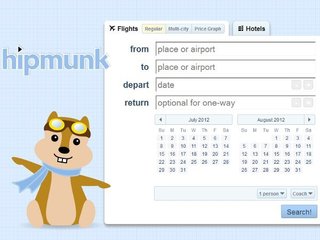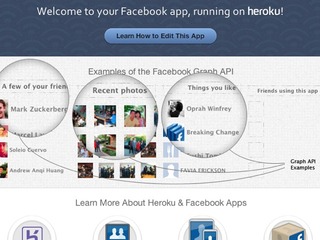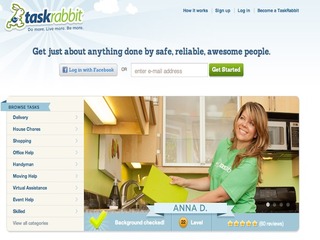The top 10 digital health accelerators
How much they invest, how long the program lasts and what they offer
Read more...
So you have the basics of your startup figured out, but you need a little help getting off the ground? You need a little acceleration, you say? You live in the Bay Area and you need information on organizations devoted to accelerating startups? Welcome, friend! You’re in luck, because if there’s one thing the Bay Area has an abundance of, it’s accelerators. Here are a few to consider:
General
Duh. Since 2005, Y Combinator has funded over 500 startups, including Airbnb, Reddit, Dropbox, Disqus, Scribd, Heroku, Hipmunk, and Omgpop, among others. The accelerator hosts two cycles for which startups can apply: one from January to March and another from June to August.
Deal terms: Startups accepted into a Y Combinator class will receive a seed investment of up to $20,000 in exchange for a 2-10% stake in the company.
What you get: A chunk of change and three months of guidance from people like Paul Graham, Gmail creator Paul Buchheit, roboticist Trevor Blackwell, Posterous co-founder Garry Tan, and more. Y Combinator will also introduce you to potential investors and acquirers.
Startups Y Combinator looks for: While the accelerator is interested in a fairly broad range of ideas, it gravitates most strongly to Web and mobile applications.
Tips for applying: Convey your idea clearly and concisely. Don’t paint an overly broad picture with marketing lingo. And Paul Graham reads a lot of Hacker News and says that commenters that he recognizes as smart people stand out to him when they apply.
Unlike other accelerators, KickLabs doesn’t do classes and batches with enrollment dates. Instead, it has an open enrollment system, though it’s currently not accepting applications.
Deal terms: KickLabs says it doesn’t typically offer startup capital as most of the startups that go through its program have already raised capital elsewhere.
What you get: Office space and mentorship from advisers like serial entrepreneurs Phil Kaplan and Mark Goldstein, Rick Borenstein of Sequoia Partners, AJ Shandley of Atlas Ventures, and music legend MC Hammer, among others. Some of the startups that have gone through KickLabs include Kiip, Hackstar Academy, Socialize (recently acquired by ShareThis), and more.
Startups KickLabs looks for: KickLabs is interested in digital media, including mobile platforms, video distribution, analytics, advertising, social gaming, commerce, social media, and cloud based technology. Ideally, the startup has already raised some seed capital and has a minimum viable product, or will have one within a few months.
Founded by ex-Googler Thomas Korte, AngelPad takes on two cohorts a year for 10 weeks each. AngelPad says it differs from other accelerators in that it allows for more personalized mentorship through its small program (about 12 startups each). It also places a strong emphasis on product development and market fit, and mentors are more involved in the fundraising process.
Deal terms: In 2011, AngelPad kicked up its seed offering a notch. All accepted AngelPad startups are offered $120,000—a $20,000 seed investment and an additional $100K convertible note.
What you get: Seed funding, mentorship, office space, and AngelPad also takes care of the paperwork for you, including incorporation, immigration visas, and fundraising documents.
Startups AngelPad looks for: AngelPad couldn’t be reached for additional information, but some of the startups that have come out of its 10-week programs include mobile app monetization service MoPub, same-day delivery service Postmates, mobile app performance management solution Crittercism, and car insurance comparison platform CoverHound, among others.
(500 has a special place in my heart Dave McClure looks and sounds just like my uncle. Which is not to say he’s particularly avuncular. He’s not. But he looks like my uncle.)
Founded in 2010, startups that have come out of 500 Startups include TaskRabbit, SendGrid, Wildfire, Udemy, and Twilio, among others. In addition to its accelerator, 500 Startups also offers a separate seed fund.
Deal terms: Startups who participate in 500 Startups’ accelerator program get $50,000 for 5% equity. 500 also participates in follow-on investments up to $200,000 for startups that are doing well.
What you get: Workspace, mentorship from the likes of LivingSocial’s Aaron Batalion, HotelTonight’s Adam Grenier, Hulu’s Andrei Marinescu, Udemy’s Gagan Biyani, and more. Startups can also participate in 500 Startups’ unique events, like GeeksOnAPlane, UnSexy, and Smash Summit.
Who should apply: 500 Startups’ investment themes include Consumer & Commerce, SMB/SaaS, Family Tech, Education, Marketing, Mobile/Tablet, Food Tech, Financial Services/Payments, etc. The accelerator looks for strong cross-functional teams, a functional product that solves a problem for a specific customer, promising traction, a simply revenue model, a capital-efficient business, and a primary reliance on Web-based, scalable distribution.
Founded in 2010 by founders and executives from MySpace, BitTorrent, Lefora, and more, i/o ventures takes much smaller batches than other accelerators. Each batch consists of only five startups, so the program is much more personalized.
Deal terms: i/o ventures invests up $25,000 in exchange for 8% in common stock.
What you get: Accepted startups get enough funding to keep the team alive during the three month program, which includes workspace and mentorship from the likes of Mint founder Aaron Patzer, YouTube co-founder Jawed Karim, Digg founder Kevin Rose, Yelp co-founder and CTO Russ Simmons, serial entrepreneur Phil Kaplan, and more. I/o ventures also organizes offsite events and activities so founders and mentors can chat in less work-like environments.
Startups i/o is looking for: Due to its domain expertise, i/o ventures pays close attention to Web services, client software, digital media, and gaming.
Health
Founded in 2010, Rock Health is a 501(c)3 non-profit that is nurturing startups that aim to disrupt the reptilian healthcare system. Graduates include drchrono, Cardiio, Docphin, and Wello, among others.
Deal terms: Rock Health offers startups $100,000 in a convertible note.
What you get: Mentorship and guidance from other entrepreneurs and Rock Health’s partners at Kaiser, Mayo Clinic, Harvard Medical School, and UCSF. You also get workspace (startups are required to work full-time at Rock Health’s office), a $2000 credit for Amazon Web Services, an Apple discount, and access to Rock Health’s corporate partners, including GE, Genentech, Nike, Qualcomm, Quest Diagnostics, and UntiedHealth.
Who should apply: Rock Health looks for product-centric ideas that solve real problems in healthcare. Ideas should address large problems in the system, with a business model that is sustainable and scalable. Some of the needs Rock Health is seeking to address include technology to reduce the cost of home health care for seniors, smart health sensors to bring down the costs of diagnostics and monitoring, and software or sensor applications that could monitor patients between doctor visits to alert their practitioner if a problem is detected.
Education
Imagine K12 is tackling a big market: K-12 education. By applying technology to education, Imagine aims to solve some of the persistent challenges that face educators, students, and families across the country. Its first class was in Summer 2011, and since then, 39 startups have graduated from the program and 70% of graduates (not including the most recent winter 2013 cohort) have gone on to raise additional funds. Graduates include ClassDojo, Goalbook, Chalk, and more.
Deal terms: Imagine K12 recently raised additional funding from outside investors so that it can now provide all accepted startups with $100,000 in seed financing. In exchange, Imagine takes a 2-10% stake in each company.
What you get: Three months of mentorship and meetings with educational experts, top investors, and Silicon Valley leaders. Imagine K12 doesn’t offer workspace, but Imagine holds weekly meetings with each startup. Startups also enjoy weekly dinners with special guest speakers, which have included Newark Mayor Cory Booker, The Lean Startup author Eric Ries, Emily Bobel of Teach For America, LinkedIn CEO Jeff Weiner, Knewton CEO Jose Ferriera, Netflix CEO Reed Hastings, Paul Graham, Tim O’Reilly, and more.
Who should apply: According to the website: entrepreneurs with ideas that scale and that impact outcomes for kids. In the end, we choose folks whom we believe in. The founders we fund have both the skill and the drive to make their ideas become reality.
Hardware
While other accelerators are built around consumer Web products and services, Lemnos Labs is an accelerator specifically designed to meet the needs of hardware startups, which face unique challenges like bad production runs, safety recalls, and design delays.
Deal terms: Lemnos invests up to $100,000 for a 2-10% stake.
What you get: The 6-9 month program offers warehouse space, access to prototyping and testing facilities, legal services, introductions to suppliers, weekly office hours, and more. You also get mentorship from founders and VCs from Electronic Arts, Bain Capital, O’Reilly AlphaTech Ventures, Bossa Nova Robotics, Zynga, Justin.tv, and more.
Who should apply: Tech-minded founders, those with experience and expertise with their target market, and those with a “duct-tape prototype”—or some tangible example of what you’re building.
Civic/Government
Described as a “Peace Corps for nerds,” the Code for America accelerator is a four-month program for “civic startups,” companies that are aiming to disrupt the way government and communities interact. The CfA accelerator supports for-profit startups that are making the experience of engaging with government more like the consumer Web.
Deal terms: CfA takes a decidedly different approach to this whole early-stage seed funding thing by offering startups $25,000 in exchange for…nothing. CfA takes no equity in the company.
What you get: Money, workspace, and guidance from leaders across business, technology, and government, including former White House CTO Aneesh Chopra, Tim O’Reilly, Flickr and PinWheel co-founder Caterina Fake, Ron Conway, and Deputy White House CTO Chris Vein, among others.
Startups CfA is looking for: CfA is looking for “civic startups,” which include startups that provide services on top of open government data, startups that bring modern Web technologies directly to governments, and startups that change the way citizens request and receive services from government.
Mobile First
Boasting a 90% success rate, Tandem is an accelerator for mobile-first startups that are tackling large market opportunities. The highly selective accelerator only accepts six startups per session. Graduates from Tandem include PlayHaven, Sift, UpOut, Pagerduty, and more.
Deal terms: Tandem offers accepted startups $200,000 under a convertible note with no cap in exchange for an initial 10% stake in the company.
What you get: Six months of workspace and hands-on guidance and input from seasoned entrepreneurs and executives. Because of Tandem’s small class sizes, startups can look forward to a lot of engagement and one-on-one time. Startups actually move their offices into Tandem’s space for the duration of the six-month program. Founding partner Doug Renert says that if you’re just looking for money and some networking opportunities, Tandem is not the right place for you.
Startups Tandem is looking for: Tandem is particularly interested in startups that are focused on large markets ripe for disruption. It’s also looking for startups that can operate leanly at the outset but scale quickly when the time is right with additional funding and resources.
How much they invest, how long the program lasts and what they offer
Read more...They include MedTech Innovator, The TMCx Accelerator, Insight Accelerator Labs and KOA Accel
Read more...They include Zurich Innovation Championship, VentureClash and FFiT InsurTech Competition
Read more...
Joined Vator on

Joined Vator on








